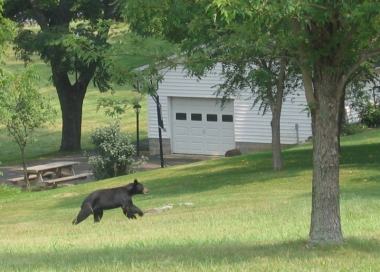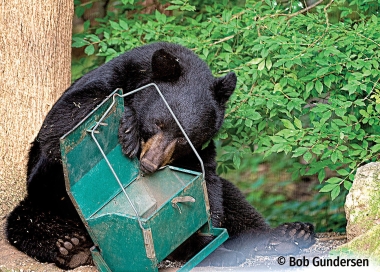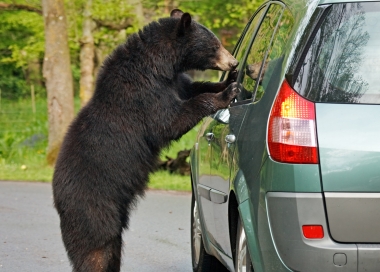
Why bears can’t be relocated
• Bears have a very strong tendency to return to the place they were captured – some travelling up to 50 miles to return.
• Bears that have become habituated to “human food” tend to repeat the same bad behaviors in their new location. Relocating bears is essentially exporting the problem to another community.
Most habituated nuisance bears that are captured have to be humanely killed to protect human safety.
Outdoor safety tips
Black bears are seldom aggressive and rarely injure people. Follow these BearWise tips to avoid encounters.
Hiking
- Be aware of your surroundings.
- Try not to hike alone.
- Keep the kids within sight and close by.
- Make noise periodically so bears in the area can avoid you.
- Keep dogs on a leash at all times, or leave them at home.
- Double bag your food and pack out all food and trash. Leaving scraps, wrappers or even “harmless” things like apple cores teaches bears to associate trails and campsites with food.
Camping
- Keep a clean camp.
- Don’t burn food scraps or trash in your fire ring or grill.
- Don’t store food, trash, clothes worn when cooking, or toiletries in your tent. Store in approved bear-resistant containers OR out of sight in a locked vehicle OR suspended at least 10 feet above the ground and 10 feet from any part of the tree. Local storage regulations vary.
- Cook downwind and as far from your tent as possible.
- Set up backcountry camps away from dense cover and natural food sources.
Fishing & hunting
- You are more likely to encounter bears when moving quietly and traveling early and late in the day when bears are most active.
- Follow tips for hiking and camping safety.
- Know that carcasses, gut piles and bait may attract bears.
- If a bear beats you to your catch or kill, don’t try to reclaim it; leave the area when it is safe to do so.
Carry bear spray and know how to use it. Keep bear spray accessible; it’s proven to be the easiest and most effective way to deter a bear that threatens you.
Precautions for dog walkers, cyclists and joggers
- Always keep dogs leashed. Letting dogs chase or bark at bears is asking for trouble; don’t force a bear to defend itself.
- If you travel quickly and quietly, you can easily surprise bears. Stay alert; music and phones are distracting. Be aware of your surroundings; make noise periodically.
If you encounter a black bear
- If you see a bear before it notices you, don’t approach. Stand still, enjoy the moment, then quietly move away.
- If a bear sees you, back away slowly. Never run; running may trigger a chase response.
- If a bear approaches, hold your ground; wave your arms and yell “Hey bear” until it leaves. Always stay with your group. If a bear keeps approaching, use bear spray.
- If a black bear makes contact with you, do NOT play dead; fight back aggressively.
Print a copy of these tips to share with you camping, hiking, hunting and fishing partners. Mire e imprima estos consejos en español.
Bears in the Rogue River Canyon
This video from the Rogue River Canyon offers an example of potential conflict between bears and recreationists.
Header image by Kathie Waibel.





